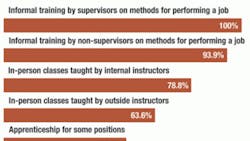Providing 21st-Century Skills for 21st-Century Manufacturing
President Obama and his Republican challengers are ramping up their rhetoric about creating more manufacturing jobs in the United States. Considering the critical role that the manufacturing sector plays in stimulating the economy, the attention is well-warranted. And assuming both parties can come together to create a tax and regulatory climate that encourages new factory investments here, U.S. manufacturers should be ready for all those new employees.
The question is, will the employees be ready for manufacturing? According to a majority of top-level executives, as of right now the answer is a resounding "no."
Facing the Skills Gap
As the latest skills-gap survey by the Manufacturing Institute and Deloitte shows, despite continued high national unemployment rates, more than 80% of manufacturers say they are experiencing a moderate to severe shortage of skilled production workers. By some estimates, 600,000 manufacturing positions remain unfilled due to companies' inability to find people with the right skills.
That's because the changes in manufacturing processes over the past decade have been dramatic. The typical shop floor today has more computers than people. Those computers are hooked up to machinery requiring a level of technical sophistication that would leave even the most ardent teenage video-game enthusiast in the dust. In fact, the employees who operate this advanced equipment are more technologically savvy and typically know more trigonometry and calculus than most American citizens, including the policymakers who are stumping on their behalf.
Given the challenge of not enough workers entering the workforce with sufficient knowledge and skills, what are manufacturers doing to bridge the skills gap with the employees they're currently hiring?
Making the Education Offer
MAPI asked that question of some of the top HR executives in manufacturing. The survey results revealed that manufacturers are offering in-house training, and many are expanding and diversifying their educational offerings. An increasing number of manufacturers, such as MAPI members Kennametal and Bison Gear, are collaborating with local secondary and postsecondary schools to create the curricula necessary to meet their changing needs. These programs aim not just to ensure that factory employees work more effectively, but also to build bench strength in preparation for baby boomer retirements.
Among the ways that American manufacturers are training their employees:
- In training entry-level production employees, three-fourths of respondents provide in-person classes taught by internal instructors, and two-thirds provide in-person classes taught by outside instructors. Three-fourths of respondents also provide in-person classes (taught by both internal and external instructors) in training their intermediate/advanced production employees.
- In their production-employee training programs, a large majority of companies are giving more emphasis to enhancing skills for working as part of a team. In addition, a large majority of respondents have changed their training programs to give more emphasis toward enhancing the capacity to think through the logic of a process.
- In their training and development programs offered to engineers, a large majority of companies are placing more emphasis on having engineers gain a capacity to understand the needs of customers.
- A substantial majority of respondents pay for their production employees to obtain multiple course certificates at a technical school or community college.
- Two-thirds of respondents are paying for bachelor's degree programs for production employees.
There is a significant evolution occurring in how American manufacturers recruit and train employees of various levels. With STEM requirements in the business world outpacing the education system, companies are developing innovative ways to compete against each other and the rest of the world to maintain a competitive workforce.
Stephen Gold is president and CEO of Manufacturers Alliance for Productivity and Innovation (MAPI), an executive-education and business-research organization in Arlington, Va.
